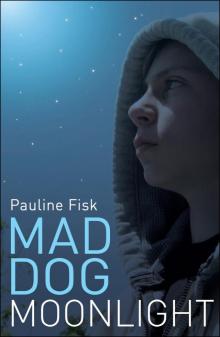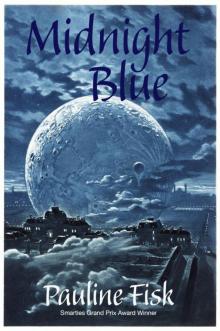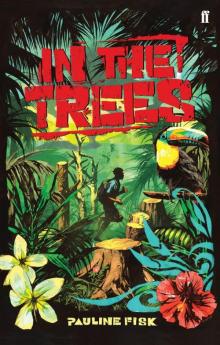- Home
- Pauline Fisk
In the Trees Page 10
In the Trees Read online
Page 10
To an accompaniment of voices singing ‘Happy Birthday to You’, Kid stripped off and stepped into the shower for six long blissful minutes of sheer heaven before the hot water finally ran out. Maybe Joanne’s shower gel wasn’t quite as bubbly as Nadine’s back in England, but then hers wouldn’t have been bio-degradable.
Kid emerged when the last drop of water had finally run dry. His face was shining. His hair was squeaky-clean. Every bit of him was squeaky-clean, and the sight of Jez holding out to him the only remaining item that could possibly be on his wish list – an ice-cold Belikin beer – was almost more than he could bear.
‘Where did you get that from?’ he yelled.
‘You’re not going to believe this, so I don’t know if I should tell you,’ Jez said.
‘Go on,’ said Kid.
‘It’s a famous fact,’ Jez said.
‘What’s a famous fact?’
‘Belizean rivers run with Belikin beer.’
Kid laughed at that. So did everybody else. Jez said, ‘You don’t believe me …?’ plunged down beneath the surface of the water and came up with a whole crate of Belikins.
Everybody yelled this time, not just Kid.
‘How did you do that?’ they wanted to know. ‘Where did they come from? How did you smuggle them in without us knowing?’
But Jez never told them. It was his secret.
After that, they ate and drank, sang, danced and gambled wildly on a roulette table fashioned by Star Wars Al and Jack-the-Goth out of flattened tin cans. The gloom was lifted as if no disagreements had ever taken place. Someone got out a mouth organ. Someone else turned a couple of cans into bongo drums. Everybody danced.
Then Fritz got out a piece of paper, folded it flat and, in the light of his head-torch, sang a special song. It had started as a poem, he said, but he’d been working to turn it into a song ever since he’d known about Kid’s birthday.
‘It’s dedicated to you all,’ he said. ‘But especially to Birthday Boy here. It’s sort of about us all, and our life here in the forest, and our lives back at home, and our families and friends. I call it “Paradise”.’
Everybody fell quiet and Fritz sang unaccompanied:
The birds and the bees and the fish in the seas
Couldn’t have a better time than you and me.
Here together, they’ve been here for ever
Living in perfect peace.
In this garden of God, with our staff and our rod
We will roam and ramble and plod,
We are here to observe, to maintain and preserve
This most glorious garden of God.
Well, it came to me in a series of dreams,
That not everything is all it seems
My brother’s disguises are all that he prizes
But they’re gone when he puts them to sleep.
My sister’s heart craves more for her part
Than anyone could ever give,
Too much to buy, with too little time,
Not enough life left to live.
Friends on the street, they call up to me
They’ve found a dead dog on the road
They laugh and they joke at this sad body broke,
Their duty to life they don’t know.
Brothers and sisters, friends and neighbours,
All who choose to hear,
I’ve been away for a number of days
And must sing my song to you clear.
You may not like it, you may rebuke it,
You may throw it back in my face,
But truth must be told, be it ever so bold,
We’re just gardeners of this place.
Earth is not ours for the taking,
Whatever our birthplace or breed,
It’s only a mess we are making,
Only deeper will our digging lead.
We are on this planet, not of it,
Caretakers roaming free,
And whilst we can take what we want and have it,
Earth is not ours – nor shall ever be …
The last note trailed off and everybody sat in silence. The tune lingered in the air long after Fritz had stopped. When he finally looked up, there was a hint of tears in his eyes. Where was the joker now? Where was the writer of funny songs, who always had them all in fits of laughter? People said the song was amazing, but they only said that because they had to say something. The word amazing wasn’t right at all.
Finally a few people started drifting off to bed, including Fritz, whose feet were bothering him, he said, and Jez, who said it would be work the same time as usual in the morning – they should bear that in mind if they decided to sit up until five o’clock mixing cocktails out of beer and Kool-Aid.
But the boundary cutters were greedy for any gossip that they’d so far missed, and there were plenty of people, including Kid, who were willing to stay up and fill them in on who fancied whom, who’d fallen out with whom and whether any xateros had been seen.
They sat up together until the questions all finally ran dry. Then they still sat up, unwilling for the night to end. Fritz’s song had been amazing, Tilda said, trying to keep the conversation going. And so sad, when one thought about the poor guy’s own background. She felt really sorry for him.
Why sorry? everybody wanted to know. And what background? What did Tilda mean?
Tilda lowered her voice. It had been there in the song, she said, in a tone of voice that couldn’t help but give away how much she enjoyed gossiping. All that stuff about brothers and sisters, and having things thrown back in your face.
‘Fritz is only here because his family hates him,’ she said, ‘and want to be rid of him. He’s the oldest son, which means he’s inherited loads of money, and his brothers and sisters are jealous of him. And a castle. He’s inherited that too. And a title, would you believe. His real name’s not Fritz, you know. It’s Clarence James William Oliver Something-hyphen-Something else, Lord of Dah-de-Dah – I can’t remember what.’
If Tilda had said that Fritz was king of England, Kid couldn’t have been more shocked. ‘Fritz is a lord?’ he said. ‘A lord? How do you know that?’
‘I picked it up during jungle training,’ Tilda said.
There was more apparently, but Kid didn’t want to hear it. Let Tilda gossip if she wanted, but he was heading off for bed. He’d heard enough.
Lying in his hammock, though, Kid couldn’t sleep. Fritz was one of the lads. He was one of Kid’s mates. He was a regular guy, like anybody else. He didn’t act posh. He didn’t even sound posh. He was just himself – a joker one minute, a real hard worker the next. Not some wet-eared lord who lived in a castle somewhere, but a down-to-earth guy who didn’t even complain about his terrible feet.
Next day the boundary cutters set off again – this time for real – saying they’d meet up again at Caracol. After they’d gone, the bunkhouse builders dragged themselves up the hill to work, knowing that it was going to be difficult after a night of partying. They gave it their best shot though and, at the end of the day, Jez congratulated them.
‘When I first met you lot,’ he said, ‘I didn’t know what to make of you. But I’m really proud of you. Time and again you’ve proved the critics wrong who think that gap-year projects aren’t about hard work, and the people who go on them are only interested in having fun.’
Jack-the-Goth said that everything young people did these days always got put down. If they passed exams, he said, they were never as hard as in their parents’ day. If they pierced their noses, they were thugs. And if they went on gap-year projects, however challenging, they were accused of bumming round the world, simply having a good time.
Fritz agreed. ‘People think that only rich kids do things like this,’ he said, ‘because their parents pay for them. They don’t want to hear about the challenges we face, not least in raising funds to get out here.’
Kid snorted at that. He couldn’t help himself, but the others didn’t seem to notice.
&nbs
p; ‘I can’t talk,’ Snow confessed. ‘My trip was paid for by my grandmother – but I do intend to pay her back.’
‘My trip was funded by working in a laundry,’ Joanne said, ‘which I hated, by the way.’
‘I wrote off for sponsorship,’ said Wallace, ‘and earned the rest working in a pub.’
Most of the others had done a mix of both, sponsorship and work. Apart from Snow, only Star Wars Al had had the whole thing paid for him outright. But he said it was only because his brother had won money on the lottery.
Fritz said, ‘No such luck for me. In order to get out here I had to work every school holiday for a year. In fact, I even worked on Christmas Day.’
Kid laughed at that. It wasn’t a nice laugh – and this time people heard.
‘What’s eating you?’ Fritz said.
Kid knew that he should stop, but couldn’t do it. It had been a long, hard day and he didn’t have the energy for self-restraint. Besides, what other people had worked to fund-raise for had come his way for free, and the conversation made him feel defensive.
‘What’s eating me?’ he said, surprised by the force at which his words came out. ‘I’ll tell you what. It’s people who tell lies.’
The group fell silent. Kid’s words were so unexpected that for a moment no one knew what to say. Then Hal spoke up. ‘What are you on about?’ he demanded, as if he had some special role as Fritz’s defender. ‘Come on. Spit it out. That was a nasty thing you just said. Explain yourself.’
Kid sensed a trap, but couldn’t step back. ‘I’m on about Fritz being a lord,’ he said, ‘and owning a castle and being rich. He doesn’t need to pretend he’s like the rest of us, working on Christmas Day and things like that. He can drop the regular-guy crap. We all know the truth.’
Kid looked at Fritz when he said that, and Fritz flushed as if he’d been landed a punch. ‘You’re a liar,’ Kid said. ‘If you’re rich you should have said. A liar and a hypocrite.’
His words echoed round the group. No one knew where to look. But then Snow spoke for all of them. Her face was flushed with anger and her voice was shaking.
‘It doesn’t matter who Fritz is,’ she said. ‘He doesn’t have to say, and neither does anybody else. This is the jungle, for God’s sake, the place where everybody is the same. Here it doesn’t matter who any of us were back in our old lives. How dare you speak to Fritz like that? Who do you think you are?’
Kid felt everybody’s eyes on him. He struggled to say something that would put things right, but the damage was done. People didn’t want to know. One by one, they walked away.
‘Well, you messed up there,’ said Jez when no one else was left.
‘You don’t have to tell me that,’ Kid replied.
Next day Fritz wouldn’t look him in the eye. Kid wanted to say sorry but couldn’t get near for Fritz’s army of friends. Hal gloated openly, delighted at the turn events had taken. But Kid knew it wasn’t Hal to blame. He’d done this to himself. If the whole team turned against him, it was only what he deserved.
It took Snow a couple of days to speak to him. Finally she came round, but there was an awkwardness between them after that. And Kid never got the chance to put things right with Fritz. A few days later, having continued to keep him off work, Cassie finally said enough was enough. She showed Fritz’s feet to Jez, who agreed that she was right, and Fritz was informed that he’d have to go to hospital.
‘What d’you mean, hospital?’ he protested. ‘There’s nothing wrong with me, only my feet.’
‘You won’t have feet much longer if you don’t get some medical attention,’ Cassie said.
After that, things happened very quickly. An emergency air-ambulance flew in, which Fritz wasn’t even allowed to walk to but had to be stretchered. Kid tried to get close enough to wish him luck, but couldn’t make himself heard above everybody else. Cracking jokes to hide how much he cared, Fritz was lifted into the helicopter.
‘See you later,’ he called out.
But he knew he wouldn’t. You could see it in his eyes.
17
JAGUAR
It came as a shock to see Fritz go, but then so did discovering that the outside world was only thirty minutes’ flight away. That was how long it took to airlift him to hospital in Belize City. Maybe their camp in Rio Blanco was miles away from civilisation, but civilisation wasn’t miles away from it.
The word came back via Jez’s satellite phone that Fritz was being taken good care of in hospital, and Wide-World’s field manager, Craig, from their base in San Ignacio, was with him. The situation was serious, but Fritz was in good hands.
Kid knew he shouldn’t, and that it made no sense, but he felt to blame. Maybe Fritz had left because of his feet, but Kid couldn’t help feeling as if he’d left because of him. For the next few days he worked like the furies to make up to the team for being one man short. But everyone was cool with him, and an air of gloom hung over the camp. Not even the unexpected sighting of a pair of scarlet macaws one morning could raise a cheer. Someone saw them. Someone else pointed. They all looked up. And that was it.
Work progressed slowly, and a string of rainy days spent labouring through mud didn’t help. The soldiers grumbled that it wasn’t the rainy season yet. Even Hubert, who could see the best in every situation, complained about the weather being all upside-down.
Some days work ground to a halt completely and people spent their time under the tarpaulin playing cards. But no sooner had Jez started talking about their falling behind their schedule, jeopardising the Caracol trip, than the rain clouds blew away and the sun came out to stay.
Work started motoring at last. The bunkhouse floor was finished off. Its walls went up. Work began on the frame to take the roof. People laboured until dark and were up again at dawn.
‘If things stay on schedule, we’ll be off in a week,’ Jez said. Then, ‘If they stay on course, it’ll be a couple of days.’ Then, after liaising with Candy on the satellite phone to find out where the boundary cutters were, ‘That’s it. We’re off tomorrow.’
All bunkhouse building ended that day at lunch time, and the afternoon was spent preparing for the trek. For the first time in weeks people would be leaving the confines of Rio Blanco, and excitement hung in the air. That night, everybody fell into their hammocks with their minds full of ruined cities, Mayan temples and the party they’d be having with their boundary-cutting friends.
A breeze blew through the forest that night, bringing with it a sense of change. Kid was awake early, eager to be off. It wasn’t even light yet, but he got up for a pee, trying not to waken anybody, and started creeping through the camp. The breeze had blown itself out by now and, in the stillness of dawn, something moved in the kitchen area. Kid tried to see what it was, and realised it was a dog.
Kid forgot about peeing. The dog was in the kitchen area, rummaging for scraps. But, as everybody knew, there were no wild dogs in the forest and the nearest semi-domestic ones were over the hills in Gold Mine. Whose dog, then, was this? Kid drew in his breath. He couldn’t see anyone but, just as he was about to take a step forward, a low whistle from behind him called the dog away.
Kid span round. In the first thin light of morning he could see the food store, its shelves packed with provisions. He could also see a figure standing between them, staring straight at the dog as it bounded towards him. He wore an old string vest, ragged jeans, a pair of battered-looking trainers and a baseball cap. He was as thin as a rake and clutching a sack which he’d been filling with food.
Kid let out a cry, and the figure saw him. He turned towards Kid and, in his free hand, Kid saw a gun. The two of them stared at each other. The moment was alive with possibilities. Kid could have shouted a warning across the camp. He could have launched a one-man attack. He could have aimed for getting back the food. He could have ducked, or dived or gone for the gun. Was it loaded, or was it just a threat? And what about the dog – would it attack?
For a moment Kid did nothi
ng, though. For this was a xatero, wasn’t it? One of the mighty xateros that they were being guarded against. And yet there was no difference between him and Kid. He was just a boy. A poor boy, living on his wits. And so was Kid. They were both the same. Both trying to get by. Both making the best of what came to hand.
When the xatero turned and fled, Kid let him go. A couple of the tins of food fell out of his sack, but he took the rest, melting with his dog into the forest, whistling to it as they both disappeared.
Later Kid was held to blame for the stolen food. He didn’t want to admit what had taken place, but it was immediately obvious that half a shelf was empty. Hal said that, in Kid’s shoes, he’d have chased that food all the way back to Guatemala. Jez said that losing it meant everybody would have less to eat. He was worried about the xatero coming back and bringing others too. Between them, he and Hubert decided that instead of leaving just a couple of soldiers to guard the camp, they’d leave them all and only Hubert would accompany the trek.
It wasn’t exactly the best start to their holiday. With a sense of trepidation, they crossed the Rio Blanco and headed off into the jungle wondering what would happen while they were away and whether they’d be safe with three soldiers fewer to protect them. It was a long day’s trek, first following the path of the river, then cutting through the jungle, then finally reaching another river, which fell in a series of tumbling pools to the place where they set up camp.
Here Jez talked to them for the first time about Caracol. It mightn’t look like it, he said, but already they’d crossed the city boundary and tomorrow they’d be heading along one of seven great causeways leading to the city centre. This city was vast, he said. It went on for miles, which meant they weren’t to think they’d arrive by tomorrow night. But when they did arrive, there’d be temples waiting for them, and mighty palaces, sweeping plazas and fabulous observatories charting the night skies.

 Mad Dog Moonlight
Mad Dog Moonlight The Red Judge
The Red Judge Midnight Blue
Midnight Blue Sabrina Fludde
Sabrina Fludde In the Trees
In the Trees